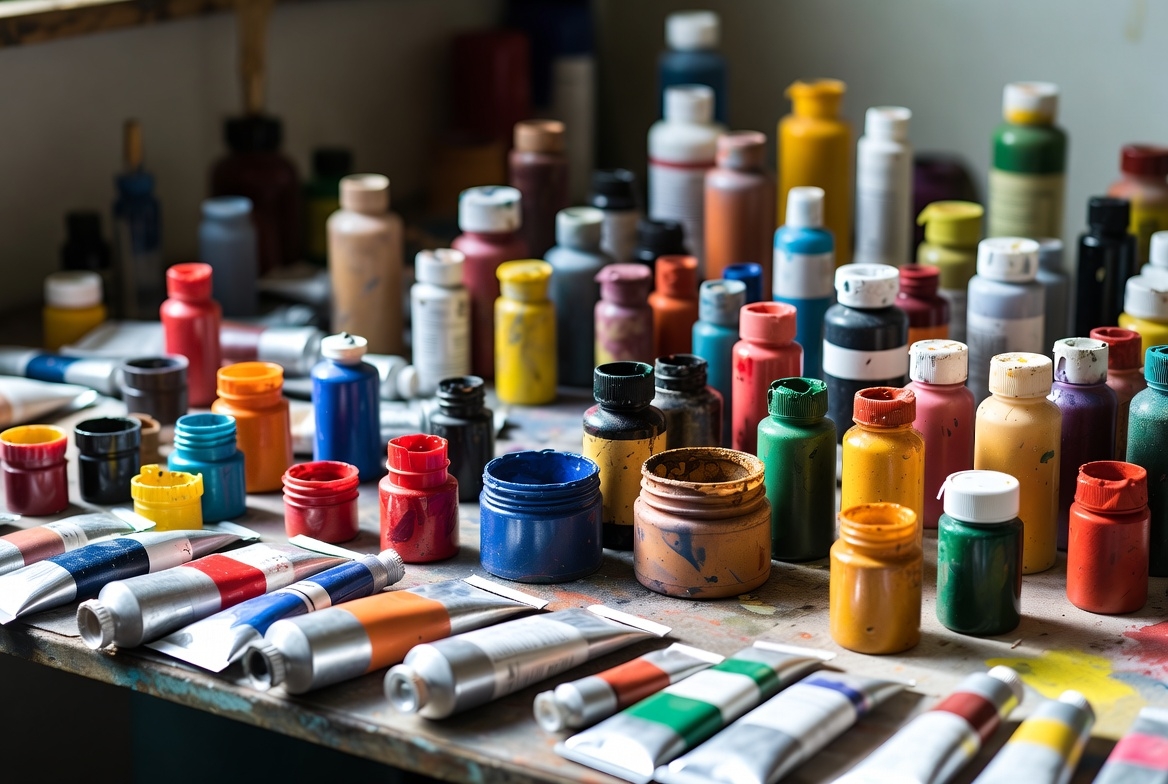Whether you’re a beginner dipping a brush for the first time or a seasoned artist restocking your studio, choosing the right paint can make or break your project. In South Africa’s diverse climate—from the sun-drenched Highveld to the humid coastal regions—the wrong medium can lead to cracking, fading under intense UV exposure, or frustration during load-shedding sessions. The right one unlocks vibrant, lasting results that stand up to our unique conditions.
This comprehensive guide breaks down every major paint type, compares key factors (surface compatibility, drying time, lightfastness, and budget), and includes decision checklists tailored to local availability and affordability. With eco-friendly options on the rise and brands like Dala leading the charge for accessible supplies, let’s find your ideal match.
Quick-Reference Paint Comparison Chart
| Paint Type | Best For | Opacity | Drying Time | Lightfastness | Price Range* | Toxicity |
|---|---|---|---|---|---|---|
| Acrylic | Canvas, wood, paper | High | 10–30 min | Excellent | R50–R150 | Low |
| Oil | Canvas, board | High | 1–14 days | Outstanding | R100–R300 | Medium |
| Watercolor | Watercolor paper | Low–Med | 5–15 min | Good–Excellent | R50–R200 | Low |
| Gouache | Paper, illustration board | High | 15–60 min | Good | R80–R150 | Low |
| Tempera | Kids, posters | Medium | 5–20 min | Fair | R20–R50 | None |
| Encaustic | Wood panels | High | Instant (heat) | Excellent | R200+ | Low |
*Price per 60 ml/2 oz tube (artist grade, approximate Rand values based on 2025 SA market averages)
1. Acrylic Paint – The Versatile All-Rounder
Why Artists Love It
- Fast-drying → Layer in the same session, perfect for quick sketches during a Cape Town sunset
- Water-based cleanup → No harsh solvents, ideal for eco-conscious creators
- Works on almost anything → Canvas, wood, plastic, even rocks—resists SA’s humidity and UV rays with proper varnishing
Best Use Cases
- Mixed-media journals inspired by local landscapes
- Outdoor murals (with UV varnish for Highveld sun protection)
- Palette-knife impasto for textured wildlife portraits
Pro Tip
Heavy-body acrylics mimic oil texture; fluid acrylics pour like ink. Opt for professional-grade options with high lightfastness (ASTM I or II) to combat South Africa’s intense sunlight—local favorites like Dala Acrylics offer great value for beginners.
2. Oil Paint – Timeless Depth & Blendability
Why It’s Still King
- Buttery blending → Seamless gradients for capturing the golden hues of a Karoo dawn
- Slow drying → Work “wet-into-wet” for days, forgiving during power outages
- Rich pigmentation → Unmatched depth, with formulations now available lead-free per SA regulations
Best Use Cases
- Classical portraiture of local icons
- Alla prima landscapes evoking the Drakensberg
- Glazing techniques for luminous ocean scenes
Safety Note
Traditional oils require odorless mineral spirits or walnut oil for cleanup. Water-mixable oils eliminate solvents entirely—ideal for home studios in urban areas like Johannesburg, where ventilation can be tricky.
3. Watercolor – Transparent Magic
Why It Shines
- Luminous transparency → Light reflects through layers, mimicking the play of light on SA’s diverse terrains
- Portable → Pans fit in your pocket for plein air painting in the fynbos
- Forgiving → Lift mistakes with water, even in humid Durban summers
Paper Is 50% of Success
| Paper Weight | Texture | Best Paint Pairing |
|---|---|---|
| 140 lb | Cold-press | Artist-grade tubes for vibrant botanicals |
| 300 lb | Hot-press | Professional pans for crisp urban sketches |
Choose UV-stable pigments to prevent fading from our high solar exposure.
4. Gouache – Opaque Water Media Powerhouse
The Illustration Favorite
- Matte, velvety finish → Scans beautifully for digital sharing on local art platforms
- Rewettable → Reuse dried pans, thrifty for budget-conscious creators
- Opaque coverage → Fix mistakes easily, great for detailed beadwork-inspired designs
Designer Hack
Acrylic-based gouache stays vibrant when scanned or photographed—perfect for print and digital workflows, with eco-options aligning with SA’s growing sustainable art movement.
5. Specialty Paints You’ll Wish You Tried Sooner
| Paint | Niche Superpower |
|---|---|
| Encaustic | Wax-based; sculptural texture for heat-resistant coastal pieces |
| Alcohol Ink | Vibrant, fluid abstracts on synthetic paper—flows beautifully in dry inland air |
| Fabric Paint | Soft, wash-fast on T-shirts and textiles, ideal for Ndebele pattern crafts |
Look for low-VOC, eco-friendly variants from South African suppliers to meet local environmental standards.
Decision Checklist: Which Paint Should You Choose?
- Project Surface? Canvas → Acrylic or Oil Watercolor paper → Watercolor or Gouache
- Time Constraint? Same-day finish → Acrylic, Gouache, Watercolor (quick-dry in warm weather) Weeks to blend → Oil
- Skill Level? Kids → Tempera sticks (affordable and non-toxic) Beginners → Student-grade acrylic from local brands Pros → Artist-grade everything with UV protection
- Budget? Under R100 → Acrylic starter set R200–R500 → Oil discovery bundle
Lightfastness Ratings Demystified (Don’t Fade in 5 Years)
| Rating | Meaning | Safe for Gallery Sale? |
|---|---|---|
| ASTM I | Excellent (100+ years) | Yes |
| ASTM II | Very Good (50–100 years) | Yes |
| ASTM III | Fair (15–50 years) – avoid direct sunlight | No |
Always check the tube. In South Africa, with our high UV index, prioritize ASTM I-rated paints to ensure your artwork endures gallery lights and outdoor exhibitions. Reputable local distributors label these clearly.
Final Recommendation
Start here: If you’re unsure, try a paint sampler set with small tubes of acrylic, oil, watercolor, and gouache. Test them side-by-side on mixed-media paper to feel the differences firsthand—especially how they handle our variable humidity. For eco-warriors, seek out water-based, low-VOC options that align with SA’s push toward sustainable art practices.

